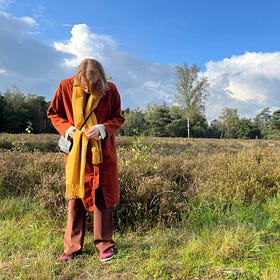I actually like overthinking
Allowing and embracing overthinking as a way to cope
Hello, I’m Philippine and to be honest, I feel like a beginner at life – I am forever trying to make sense of it. You can find my attempts at this, plus reflections, musings and experiences right here, in my newsletter. Subscribing is free! For everyone who feels like a beginner at life, and wants to connect in some way.
I think my way through life, it’s my way of being, of relating to life, trying to make sense of it. Sometimes, however, this takes a turn for the worse – or so I’ve viewed it until recently anyway.
The other day I was feeling quite crappy, so I naturally started to feel like my whole life needed fixing. Maybe I needed to write more, do something with my time – thinking ‘please let that make me feel better and fix everything’. I then desperately tried to come up with strategies that would make that happen, and so I entered fixing mode. It was an unpleasant feeling, yet the only thing that was there to hold onto, it seemed. But just like trying to struggle your way out of quicksand will make you sink faster, fixing mode seems to be more harmful than it is helpful. And yet…
When later that day I told my friend, who’s autistic like me, about my overthinking session that morning, she surprised me with her response. She said something like: that’s just how we (autistics) cope, it’s a good thing. She explained her theory by saying that it’s no different from when she organises her collection of Barbies. Only in my case I was trying to organise my life instead of something more separate from it, but either way it brings a sense of (perceived) control, taking away a sense of despair and panic. It focuses our mind, it gives it a place to direct – almost rest – our attention. I instantly loved this new and refreshing perspective. It felt true somehow.
But then why had I sensed that this kind of thinking was unhelpful earlier that very same day and so often before? Surely there was some truth in that too. This reminded me of something I read a few years ago (I’m not sure where) regarding the distinction between pain and suffering. It said that pain is an inevitable part of human life; however, suffering comes from resisting that pain, and is thus much more within our control.
I now realise that overthinking is like pain – inevitable – and struggling against it, thinking that you shouldn’t be doing it, that it’s unhelpful, that is in fact what makes it unhelpful. Whilst accepting it as something that helps me cope, makes it just that. By changing the way you look at it, you change its very nature from bogged down and stuck to an open allowing, accepting and embracing. It becomes lighter.
It’s like with your feelings, there are three options: 1) you can let yourself be taken over by them, let them overwhelm and control you; 2) you can struggle against them, pushing them away; or 3) you can acknowledge and allow them, feel them. The latter option makes it possible for you and your feelings to coexist. You are in charge, observing your emotions; they are not taking over, blindfolding you and kidnapping you to wherever they want to go. No, they are seen and welcome to stay, which means there is no need for that blindfold.
I think something similar applies to overthinking: 1) you can merge with it and spiral out of control; 2) you can try to push it away as something unhelpful; or 3) you can accept that it’s there, letting it happen intentionally. I find this idea rather liberating and exciting, because to tell you the truth, a lot of the time I actually like overthinking, and this feels like the permission to have another biscuit instead of feeling guilty for taking one secretly – and doesn’t that make all the difference?
Going back to the particular type of overthinking I started with, fixing and planning – this new perspective releases it of its biggest burden: the expectation to execute the solutions and plans, including the anticipatory guilt of failing to do so. So the embracing of fixing and planning mode gives me permission not only to go for it, but also to abandon the results of the overthinking session whenever I want.
It doesn’t make me a quitter, it doesn’t even make me someone who wastes their time planning without following through. What it does mean is that I know myself, I know what helps me and I embrace it, and when it’s not so helpful, I accept it. I don’t try to make it something that it’s not: planning with the intention of execution. Instead it is allowing myself to do what I need to cope.
Although I love this kinder outlook, it doesn’t always apply. Often overthinking gets me stuck deeper and deeper, just like in the quicksand, even if I’m trying to accept and embrace it. Sometimes even that becomes part of the struggle. This is when pretty much everything seems to make it only worse. It’s a kind of spiralling, there’s not just a lot of thinking (as in over-thinking), it’s taking you down and getting you stuck in a downward spiral, a vicious cycle deepening its groove and making you merge with your thoughts.
I think it’s helpful then, to distinguish here between three kinds of overthinking – although I would argue that not all of them necessarily indicate a surplus (that is ‘over’) of thinking. The kind that truly feels unhelpful is the one I just described, where your thoughts spiral into a vicious cycle. I’d like to call it merging, because it takes over to the extent that you become it. Then there is allowing, which is when you accept the thinking that’s happening inside of you, and thus, crucially, there is a separation of the I and the thinking. Lastly, embracing is a step up from that, when you run towards and intentionally take part in it, almost like a sort of indulging.
I’d say that these types of thinking are on a continuum starting from full merging, moving through allowing, towards embracing. Sometimes mere allowing may be most helpful, sometimes complete embracing even more so. At other times it won’t feel possible to move away from a kind of merging, although the realisation that you are (somewhat) merged with your thinking is already moving you away from it and bringing you closer to allowing. For when you are fully merged with your thoughts, you aren’t even there to realise it. As soon as you become aware of the fusion, you’ve pulled at the thread, loosening the interwoven meshwork.
Hold on, I find my own theory getting a bit confusing here. Moving away from merging and into allowing entails becoming aware. That makes sense. Yet when you try to resist overthinking, you are also aware of it – so what’s the deal with that, surely resisting can’t be called allowing?
No indeed, instead I actually think of this type of awareness as a kind of merging, because the awareness that comes from resistance is usurped, as it were, by the thinking itself. In other words: yes there is awareness, but it’s not detached from your thinking, instead it is entangled with it – and therefore very different from the awareness that is a part of allowing. The question is whether the awareness is clear or murky, pure or polluted by the spiralling thoughts.
Coincidentally, I think that this realisation shows us how the awareness that belongs to allowing, as opposed to the awareness of resistance, frees us of the infinite meta-overthinking. Once you are in true allowing, when there is a very real separation between you and your thinking, you see all of these meta-levels as one big mess, and you don’t try to tidy or organise the mess, you just observe it and let it do its thing. This doesn’t stop the endless thinking about thinking about thinking, but it does juxtapose an awareness of this process, an awareness that actively allows this spiral to happen. And that is how you know you are in fact releasing yourself from it.
Another method to move out of fusion and into allowing is, I find, writing my thoughts down. In my experience it takes away the need to go over the same thoughts again and again, because they’re out there now, released – they’ve been heard, and they’ve been given a proper place, welcomed by pen and paper. There is also a flow to the activity of writing that naturally disentangles the merging spiral and unsticks your thinking. Other activities that have a quality of flow can work too, I’ve found, such as walking or another kind of movement, drawing, cooking, and so on.
What I’m most curious about, however, is what it would be like to fully embrace, rather than merely allow, my thinking in these kinds of situations. What if I let myself indulge in coming up with ways in which I can possibly improve my life? What I’m so excited to see, isn’t if I’d actually come up with an amazing strategy to change my life, nor is it whether I’d follow through with it or what my life would subsequently look like. No, what I really hope is that it would feel better, or less bad, in the moment of thinking/planning/fixing. Would it feel lighter, calmer, more grounded, maybe even a little fun? I’m going to try and find out.
What do you think, can overthinking be a good thing? And if so, what would be a more neutral or positive word for it?
Welcome to Beginner at Life
There’s so much I want to tell you. I want to tell you about my burnout, my long Covid, the hell it’s been and the ways in which I’ve grown. I want to tell you about my autism and the new chapter of my life I’m entering, of rediscovering myself and rediscovering life. I’ve been wanting to tell you for a long time, but I thought it wasn’t the right time yet. I wanted to make everything in order so I could fully focus on it. And in a way, that would be wonderful, but I don’t think I’m able to wait.
What to do with the in-between?
My liminal space exists between being ill and well, as I’m recovering from the chronic fatigue that I’ve been coping with for four years, due to burnout and long Covid. Instead of trying to rush out of this phase that’s full of uncertainty – which is what I’ve been trying to do this whole time – I now want, and believe I need, to fully embrace the liminal space of recovery.






I can totally relate to this. I think of my own useful overthinking as thinking things through, it's essential and helps me think of ways of dealing with possible situations, so that if certain difficulties arise, I have some sort of mental preparedness, rather than being totally lost. It's possibly also a way of thinking about stories I could write based on situations I have encountered or may do so in the future